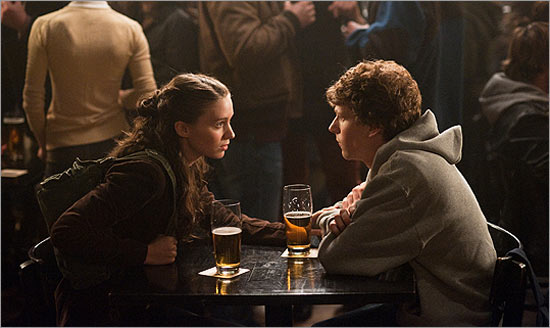
Spoiler Warning: The Social Network is not a movie that can be spoiled by mere plot details, as most of those plot details are revealed within the first 20 minutes. Regardless, if you're hoping to go into the film fresh, you should obviously avoid this review.
There's a hopeful, almost celebratory moment in The Social Network when Napster-creator Sean Parker declares to Facebook-creator Mark Zuckerberg, "This is our time!" And that, at its core, is what the film is about: the era of the geek; the triumph of the reject; the rebellion of the social outcast. Where once business relied heavily on having a wealthy, privileged, image-centric mediator to buy and sell smarter people's work, the Internet has made way for a generation of 20-somethings that no longer need to rely on the societal rules of generations past to secure a billion dollar enterprise. In this digital age, geeks have a platform filled with possibilities, and as the president of Harvard so succinctly puts it, "Inventing a job is better than getting one." In this digital age, the geeks rule. And with their newfound power, they say "Fuck you" to those unwilling to accept that they are no longer in control.
Tragically, for many of the well-meaning characters in The Social Network, they are on the receiving end of that "Fuck you".
The Social Network is not a coming-of-age story. It isn't a journey of self-discovery and growth. It's a coming-of-success story, about a kid who learns almost nothing, doesn't change and ultimately doesn't need to, thanks entirely to the luxuries that the Internet provides. His only life lesson (hence the "almost") comes as a result of betraying his best friend, a decision which costs him the only real relationship in his life.
That aforementioned moment of triumph? It's deserving of neither hope nor celebration. Were it just the landscape of business that was evolving, it might've been, but this isn't Revenge of the Nerds, and Mark Zuckerberg isn't an underdog who deserves rooting for. No, Mark Zuckerberg is a product of his time—a seemingly hollow vessel of a person that's self-important and coldly calculating, constantly shifting emotions just below the surface. He's oscillates between being petty, insecure, vindictive, apathetic, conniving, and just about every other trait that results when youth, intelligence, and an increased disconnect from genuine human interaction collide.
Mark Zuckberg is an unlikable character, no doubt, but he's also a tragic one. In an earlier decade, somebody like Zuckerberg probably would've been taken advantage of, his intellect helping catapult the success of a lesser mind with a fuller bank account. Maybe that's an experience from which Zuckerberg would've benefited. The illusion of his invincibility would've been broken, allowing him to grow up and mature and better himself. With the Internet though, all you need to achieve success is a good idea, the know-how to implement it, and enough money to keep a website running. At age 20, Zuckerberg already has those things, so all that's lacking in his life—humility, respect, basic human decency—he has no reason to learn.
The Social Network is scary, in many ways. It taps into a very real change in our society, highlighting how adolescents motivated by petty rivalries and trifling girl squabbles can very easily come to define the modern business world–and, in turn, our lives. As Zuckerberg rushes to his first billion dollars, he has no remorse for the toll his actions are taking on others, and no sense of the toll those actions will inevitably take on himself. He gains power and wealth, but in doing so only further alienates himself from the rest of the world. There's a poetry to that; the man responsible for reinventing how people connect to one another is himself completely disconnected from everyone.
The brilliance of The Social Network is that there's never a moment where screenwriter Aaron Sorkin feels the need to spell out what the film's themes and ideas are, or tell you how to feel about them. He saw how these people could serve the purpose required of them by providing them with personalities and motivations that would best personify the changing times, and allows their naturally resulting actions and dialogue—commonly occurring through propulsive streams of genuinely funny and whip-smart verbal sparring—to communicate the rest.
If the veracity of the picture is in question, it shouldn't be. Like any other story that's been inspired by true events, The Social Network is a work of fiction, plain and simple. Though the character


